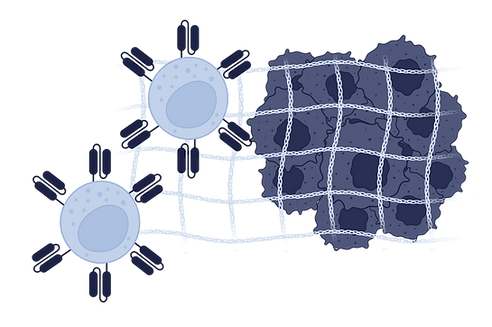
CURRENT PROJECTS

Engineering NK Cells with Enhanced Effector Functions
We are engineering NK cells to become more potent and targeted therapies. We do this in two key ways:
-
Creating smart NK cells: We equip NK cells with chimeric antigen receptors (CARs), synthetic receptors that act like a GPS, directing the NK cells to a specific target on a tumor. This enhances their ability to find and destroy cancer cells.
-
Turning NK cells into drug couriers: We're also modifying these CAR NK cells to serve as targeted delivery vehicles. They can precisely deliver powerful therapeutics—like cytokines or bispecific antibodies—directly to the tumor site, boosting the efficacy of both the engineered NK cells and the body's own immune response against the cancer.
Reprogramming the Tumor Microenvironment to Potentiate Immunotherapies
Some of biggest challenges in using cellular immunotherapies to treat solid tumors are the tumor's ability to create a hostile environment that disables immune cells and its dense, protective wall of fibrous tissue. To overcome these challenges, we are designing strategies to:
-
Boost Immune Cells: We use genetic engineering to create more robust NK cells that can survive and function in this tough environment.
-
Attack the Tumor's Defenses: We are developing combination therapies that use these engineered NK cells alongside targeted delivery of drugs that break down the fibrotic barrier or directly target the specific mutations driving the tumor's growth. We are also exploring new, targeted ways to use genetic material (like siRNA and mRNA) to directly reprogram the behavior of tumor cells and the other cells that help them survive.


Developing Allogeneic Cell Therapies that Evade Immune Rejection
Today, many of the most promising cell therapies, like CAR T-cells for cancer, require the use of a patient's own cells. This is a slow and costly process. Our lab is working to create "off-the-shelf" therapies that can be made from a universal donor, making them more accessible and affordable. The biggest challenge with using donor cells is allorejection, which is when a patient's immune system identifies the new cells as foreign and attacks them. We're focused on understanding exactly how this rejection happens and then using advanced gene editing techniques to create cells that are "invisible" to the immune system.